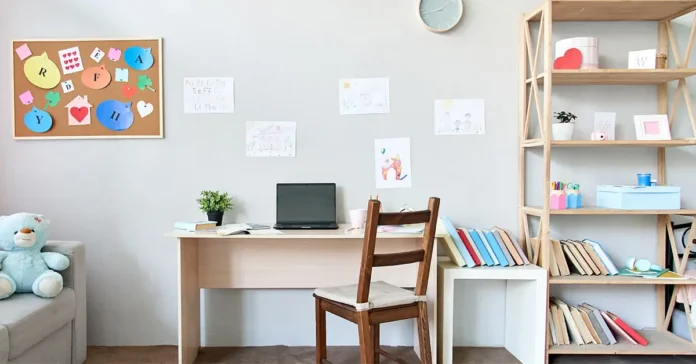Study Room Organization – Whether you’re a student, remote worker, or someone seeking a tranquil space for personal projects, organizing your study room is the first step towards unlocking your full potential. Say goodbye to distractions and hello to efficiency as we explore practical tips, creative storage solutions, and personalized touches that will make your study room a space that resonates with your unique style.
Welcome to the ultimate guide on mastering the art of study room organization – your key to a clutter-free and productive space! Get ready to create an environment that fosters learning, productivity, and a sense of accomplishment. Let’s dive into the art of study room organization together!
Study Room Organization – Use Shelf Space Wisely
Even while you may believe that you have enough shelf space, there is no such thing as too many shelves. Use them wisely instead. For instance, you could arrange your books on different shelves according to the various categories they fall under, such as fiction, history, math, etc. You will not have to be concerned about forgetting something significant in this method.
Create a Bookshelf System
Another excellent method for organising your books is with a bookcase arrangement. In other words, you will arrange a series of vertical rows according to the genres of books you read. For instance, if you prefer reading science fiction, you could arrange your books on four shelves in a row. After that, you can add your next favourite or often-read genre.
Study Room Organization – Proper Labelling
A nice label maker can be something you want to get if you have a lot of books. This will make it simple for you to categorise your books depending on the topic. You may, for instance, designate your chemistry texts as “chemistry” and your biology textbooks as “biology.” Similarly, you can designate your nonfiction books as “nonfiction” and your fiction books as “fiction.”
Colour Code your Labels
Colour coding your resources will help you manage your school supplies more efficiently and will save you time from having to go through stacks of paper. To make it simpler to discover what you need, group your materials into categories like notebooks, folders, binders, pens, pencils, etc. and choose colours that correlate with your subject. You could, for instance, designate one hue for math, another for science class, and so on.
Remove all distractions
There are distractions everywhere, including in our homes. A student can receive them in a variety of ways, including emails, phone calls, and social media notifications. No matter how they appear, we are constantly tempted to investigate them – whether it is reading emails, using Facebook, watching TV, listening to music, or playing games.
You need to understand how to control your distractions if you want to boost your productivity. You do not have to shut everything else out completely. Just make sure that you are concentrating on the current work by:
- Disabling your notification settings
- Scheduling certain times to check your messages
- Blocking access to websites or apps while working on the laptop.
Organise your materials
One of the most crucial tasks you can take to maintain organisation is organising your files. You do not want to waste all day looking for something just because you left it somewhere else. Here are some of the proven strategies for organising your materials:
Sort by Document Type
Paper and digital files can be organised well with file folders. Depending on the type of file you are storing, they are available in a wide range of sizes, shapes, and colours. You will need several folders if you use several types of files, such as assignments, reports, and printouts. You might have folders for “Printed Documents,” “Reports,” and “Assignments,” for instance.
You could, for instance, have a “Class Notes” folder for notes you take in class, a “Homework Folder” for assignments due the following week, and a “Homework Log” to keep track of the homework that must be done.
Sort by Date
Sorting your files by date will make it simpler to find specific ones if you have a lot of them. The oldest files should be in the front of the drawer or cabinet to start. Then, working your way down the list, add more recent files to the back of the drawer or cabinet, labelling each one with its name, date, and the place where the original file was originally stored. You will not forget anything if you do it this way.
Sort by Purpose
Keep your study space and entertainment space separate. Place your textbooks away from the TV, video games, and movies. Check to see if your desk, computer screen, bookshelves, etc. are free of clutter. Nothing that might distract you from your studies should be allowed. Every week, spend one hour cleaning out your room. This does not imply that you must discard everything; rather, it suggests that you organise the things you do keep.
Final Words on Study Room Organization
As we conclude our Guidebook on Mastering the Art of Study Room Organization, envision a space where productivity meets tranquility. By following our practical tips, you can transform your study room into a space of focus and inspiration. Remember, organization isn’t just about tidiness; it’s about creating an environment that fuels your academic needs.
Whether you’re a student or a professional, a well-organized study room enhances efficiency and reduces stress. Embrace the power of decluttering, personalized touches, and strategic layouts to make your study room a space where learning thrives. May your organized study room be the catalyst for success, igniting motivation and fostering a conducive atmosphere for growth and achievement. Happy studying!
FAQs
A: Start by decluttering, categorizing items, and creating designated spaces for studying and storage.
A: Adequate lighting reduces eye strain and enhances focus; consider natural and artificial light sources for an optimal study environment.
A: Utilize shelves, bins, and organizers to categorize and store study materials efficiently, ensuring easy access and a tidy study space.
A: Minimize distractions by decluttering, using noise-cancelling tools, and organizing study materials for a focused and productive environment.
A: Yes, an organized study room promotes efficiency, time management, and a conducive atmosphere for effective learning.
A: Ergonomic furniture supports comfort and proper posture, contributing to a healthier and more comfortable study experience.
A: Infuse personal touches with decor, color schemes, and motivational elements to create a study space that reflects your personality and inspires learning.
A: Digital tools streamline note-taking, scheduling, and resource management, enhancing organization and accessibility of study materials.
A: Regularly reassess and reorganize your study room based on changing needs, ensuring a consistently efficient and tailored study environment.
A: Yes, a well-organized study space reduces stress, fosters a sense of control, and enhances overall well-being during study sessions.







